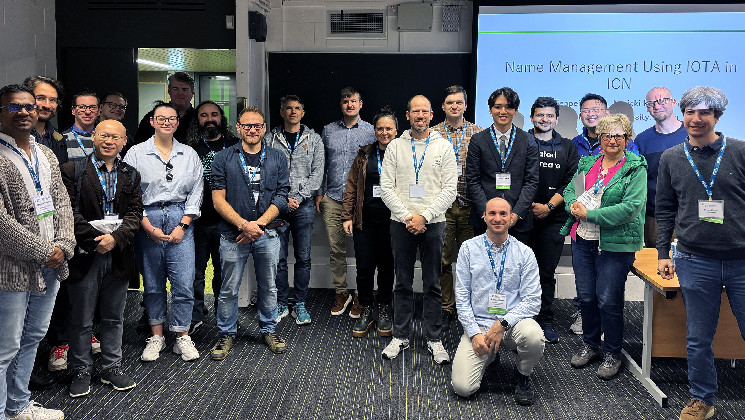Insights from the 2nd International Workshop on DAG-based Distributed Ledgers
TL; DR:
The Beyond the Chain workshop on May 31, 2024 at Trinity College Dublin explored how DAG technology can overcome blockchain limitations. Shai Wyborski’s keynote highlighted DAG’s efficiency and scalability benefits over traditional blockchains. Presentations covered topics such as secure IoT data transfer, shared objects in Sui smart contracts, name management using IOTA, and an investigation into DAG-based consensus protocols.
Solving the limitations of traditional blockchain with Directed Acyclic Graph (DAG) technology is the focus of Beyond the Chain: Workshop on DAG-based Distributed Ledger Technologies. With contributions from several members of the IOTA Foundation, this year’s edition was held on Friday 31 May 2024 in Trinity College Dublin as part of the IEEE International Conference on Blockchain and Cryptocurrency, which ran from 27 May 2024 to 31 May 2024.
Even though our workshop took place on the last day of the IEEE conference, it attracted a good audience with surprisingly few signs of conference fatigue! The session kicked off with a keynote by Shai Wyborsky (@DesheShai), a researcher at Kaspa, a PoW and DAG based distributed ledger technology. Shai’s keynote was followed by four presentations based on papers written for the conference: we will present the abstracts of these papers after a brief summary of Shai’s keynote.
From Blockchain to DAG
In his keynote, Shai highlighted the critical need to transition from traditional blockchains to DAG structures, addressing the inherent limitations of blockchains regarding efficiency and scalability. Blockchains suffer from high orphan rates and less parallelism, undermining their performance.

Participants in Beyond the Chain 2024
In DAG-based distributed ledgers – or ‘blockDAGs’ – each block can reference multiple previous blocks, creating a more complex but efficient DAG structure. Shai provided an insightful overview of various blockDAG implementations such as SPECTER, Tangle and GHOSTDAG. These systems achieve scalable and secure consensus through topological sorting. He also explored the need for parameterless protocols such as DAGKnight, which dynamically adapt to network conditions without predefined parameters, improving confirmation times and network performance.
Looking ahead, he emphasized the importance of creating rational incentives for miners to maintain protocol integrity, exploring new models for compensation markets within DAG structures, and addressing scalability through innovative consensus mechanisms.
The keynote ended with a lively discussion between Shai and the audience. The exchanges reflected a shared belief that these developments could propel blockDAGs, and DLTs in general, to new heights.
Interactive sessions
Following the keynote, the conference consisted of four interactive sessions based on research papers submitted to the workshop.
Secure immutable data transfer for low-power, long-range wireless IoT services
During the first session, Andreas Baumgartner from Chemnitz University of Technology discussed his paper, written in collaboration with his colleagues Nada Akkari, Sudip Barua and Thomas Bauschert: “Secure transfer of immutable data for low-power, long-distance wireless IoT services” . According to the article summary:
”
We will share a link to the article as soon as it is made available by the conference organizers.
A study of shared objects in Sui Smart Contracts
Shared objects – data structures that multiple transactions or smart contracts can simultaneously access and modify – were the focus of the next presentation, by Roman Overko of the IOTA Foundation. According to the abstract of his article, “A Study on Shared Objects in Sui Smart Contracts”:
.” Roman’s paper is publicly available here.
Name management with IOTA
Teppei Okada from Ritsumeikan University, Japan, presented his paper written with Noriaki Kamiyama (also from Ritsumeikan University), “Name Management Using IOTA”. The summary of the article states:
“”
We will share a link to the article as soon as it is made available by the conference organizers.
Systematization of knowledge: DAG-based consensus protocols
Finally, Mayank Raikwar (University of Oslo) and Nikita Polyanskii and Sebastian Mueller from the IOTA Foundation provided a comprehensive overview of DAG-based consensus protocols. The summary of their article states:
.”
We will share a link to the paper as soon as it becomes available
See you next year?

